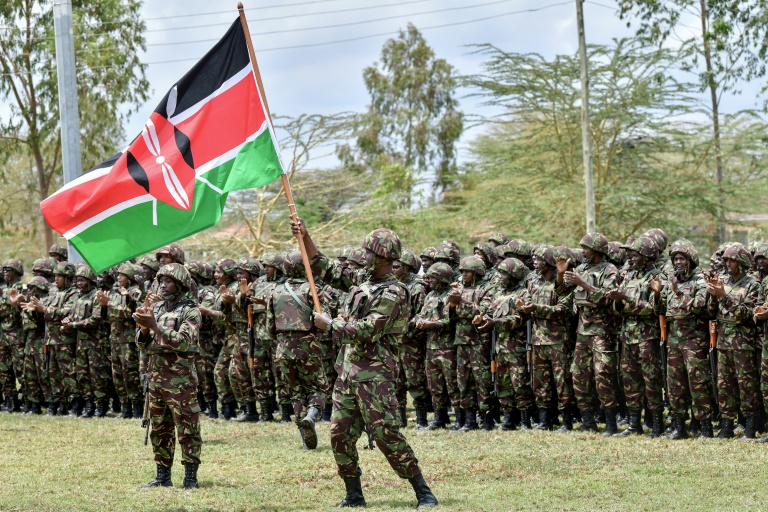Kenya sending troops to DRCongo to fight rebel advance

Kenya’s President William Ruto said the troops were on a mission to the DRC to ‘protect humanity’
Nairobi – Kenya’s President William Ruto announced Wednesday that Nairobi was deploying troops to eastern Democratic Republic of Congo in a joint regional operation against a rebel offensive.
The mineral-rich DRC is struggling to contain dozens of armed groups whose recent advances in the country’s east have revived old animosities and led to a surge in tensions with neighbouring Rwanda.
Leaders of the seven-nation East African Community (EAC) bloc, in which Kenya is the regional heavyweight, agreed in April to establish a joint force to help restore security in the DRC.
Speaking at a ceremony in Nairobi to announce the deployment, Ruto said the troops were “on a mission to protect humanity”.
“The destiny of DRC is intertwined with ours,” he added, without giving details of the deployment schedule.
“We will not allow any armed groups, criminals and terrorists to deny us our shared prosperity.”
Kenya will command the force, which will also include soldiers from Burundi, South Sudan and Uganda.
A Rwandan contingent will be deployed along the border, after Kinshasa objected to Kigali’s participation in any operations within the DRC.
– ‘Military escalation’ –
Military officials in Nairobi declined to reveal the number of Kenyan soldiers involved, citing “obvious security reasons”.
A UN force, known by its French acronym of MONUSCO, is already operating in the DRC.
Burundi and Uganda also sent troops to the DRC earlier at the invitation of the Congolese government.
The M23 rebels, a mostly Congolese group, resumed fighting in late 2021 after lying dormant for years, accusing the DRC government of failing to honour an agreement to integrate its fighters into the army.
Fresh advances by the militia across North Kivu province last month prompted the UN peacekeeping mission there to increase its alert level and boost support for the Congolese army.
The M23’s resurgence has had resounding repercussions for relations in central Africa.
The DRC accuses Rwanda of backing the militia, claims denied by Kigali.
On Saturday, Kinshasa decided to expel Rwanda’s ambassador. In turn, Rwanda accused Kinshasa of being “on the path of continued military escalation.”
– Calls for ceasefire –
The increase in violence has alarmed the international community, with the African Union appealing for a ceasefire.
Burundi President Evariste Ndayishimiye and current EAC chairman said on Tuesday he held talks with his regional counterparts on “managing the security crisis” and agreed to hold a summit at a yet-to-be-announced date.
The EAC comprises Burundi, the DRC, Kenya, Rwanda, South Sudan, Tanzania and Uganda.
M23 first leapt to prominence in 2012 when it briefly captured Goma before a joint Congolese-UN offensive drove it out.
The militia is one of scores of armed groups in eastern DRC, many of them a legacy of two regional wars that flared late last century.
The groups include the FDLR, a Rwandan Hutu rebel group based in the DRC which Kigali views as a threat and has regularly accused Kinshasa of supporting.
While Rwanda has denied backing M23, a report by independent UN experts seen by AFP in August found that Kigali had provided direct support to the militia.
The Allied Democratic Forces (ADF) — which the Islamic State group claims as its Central African offshoot — is also active in the region and is accused of slaughtering thousands of Congolese civilians and carrying out bombings in neighbouring Uganda.
